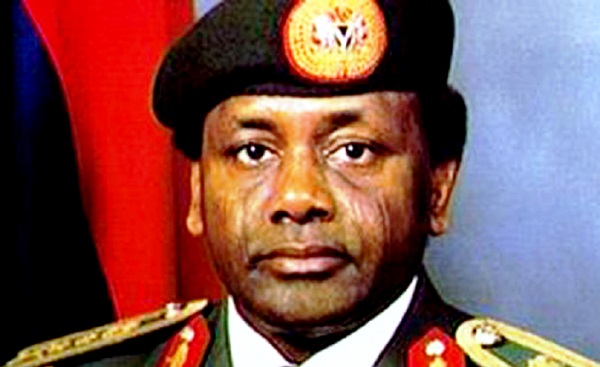General Sani Abacha
Twenty years ago today, precisely, 8 June 1998, the former Head of State, Gen. Sani Abacha, died mysteriously in office.
Dismissing reports that the Kano-born artillery soldier died after eating a poisoned apple from one of his mistresses, the former Chief Security Officer, to the late Head of State, Major Hamza Al-Mustapha (rtd) had claimed in 2017 that the late Abacha’s health system collapsed a day earlier“immediately after one of the white security operatives that accompanied the Palestinian leader, Yasser Arafat, shook hands with him.”
The ex-Nigerian strongman became unconscious and died few hours later.
While there was tears and sorrow in the Presidential Villa, Abuja, there were celebrations and dancing in Lagos and other streets across the country.
Abacha is widely remembered in Nigeria and across the world for his style of government. He was a man of few words, but deadly actions. Born on September 20, 1943 in the ancient city of Kano, he announced the coup that sacked the administration of ex-President Shehu Shagari on December 31, 1983 and brought Major-Gen. Muhammadu Buhari to power.
He also announced the then Chief of Army Staff, Major-Gen. Ibrahim Babangida, as the new military President and Commander-in-Chief of the Armed Forces in an evening broadcast on August 27, 1985.
That coup speech was read by Brig. Joshua Nimyel Dogonyaro.
Abacha was appointed the Minister of Defence in 1990.
He took over power on November 17, 1993 after a Federal High Court in Lagos had declared the Interim National Government headed by Chief Ernest Shonekan as illegal.
The ING was put in place by the Babangida’s administration following the annulment of the June 12, 1993 election presumed to have been won by the late billionaire businessman, Chief MKO Abiola.
The Abacha cabinet comprised of several prominent politicians – Bamanga Tukur, Lateef Jakande, Adamu Ciroma, Jim Nwobodo, Babagana Kingibe, who was Abiola’s running mate; Uche Chukwumerije and Solomon Lar.
It is unfair to accuse the Abacha regime as completely negative. This is because the regime stabilized the Nigeria economy. In four years (1993 to 1997), Nigeria’s foreign exchange reserve rose from $494 million to $9.6 billion and the external debt of the country was reduced from $36 billion in 1993 to $27 billion in 1997.
It should also be recalled that the inflation rate of 54 per cent inherited from the Ibrahim Babangida’s administration was reduced to 8.5 per cent between 1993 and 1998 under Abacha.
Abacha increased the price of petrol just once in his four-and-a-half years stint in office and set up the Petroleum (Special) Trust Fund, which was widely acknowledged to have performed well in infrastructural development and intervention programmes in education, health and water.
In sports, Nigeria excelled under Abacha. For the first time, Nigeria earned gold medals in the 1996 Atlanta Olympics including the much coveted one in football.
He personally phoned the players and other sportsmen and women during these competitions. He motivated them and they in turn won laurels for Nigeria under the then Sports Minister, Chief Jim Nwobodo.
In 2014, the Goodluck Jonathan’s administration chose Abacha as one of Nigeria’s greatest heroes for “unity, patriotism and national development.”
However, he is remembered for his scarce public appearance and refusal to grant interviews or allow the publication of any personal information about him and developed a habit of working only at night.
He had informed Nigerians during his national broadcast, on assumption to power in 1993, that his regime would be “firm, humane and decisive” and any attempt to test the will of the regime will be decisively dealt with.
And he lived up to these words, with the continued arrest and detention of journalists and Nigerians that criticized his regime. Between 1995 and 1996, at least 200 senior officers were sacked, including the first Chief of Army Staff, Chris Alli.
His successor, Ibrahim Alkali, was also fired on grounds of outspokenness. The killing of the Ogoni nine still remain fresh in the minds of Nigerians, with the international community tagging Nigeria “a pariah state.”
Abacha also jailed prominent Nigerians like Sheu Yar’Adua, Olusegun Obasanjo and Chief MKO Abiola (winner of the June 12 1993 elections), for revolting against his regime.
Yar’Adua and Abiola later died in prison.
Abacha was also accused of looting the treasury, stashing the funds abroad, especially in Switzerland.
© 2024 Tonygists | Portions are © 2024 Associated Press. All rights reserved. This material may be published, broadcast, rewritten, or distributed.






